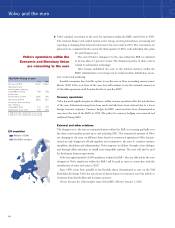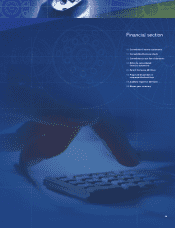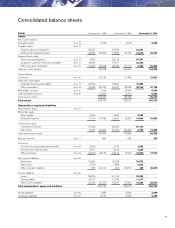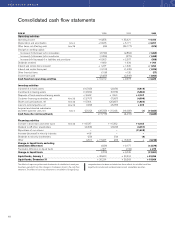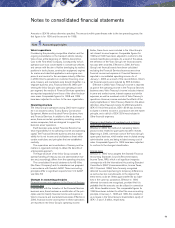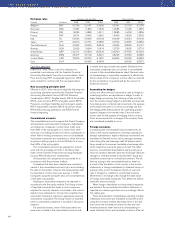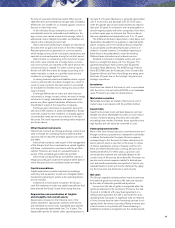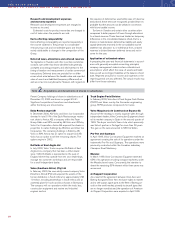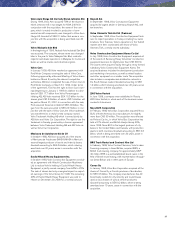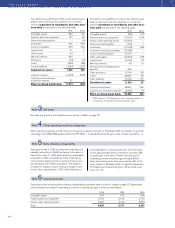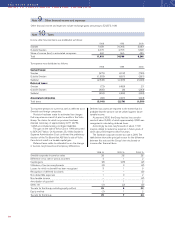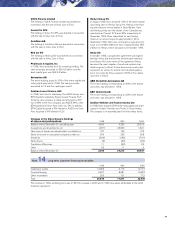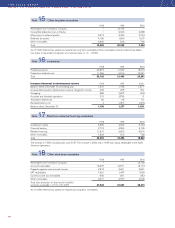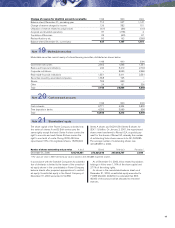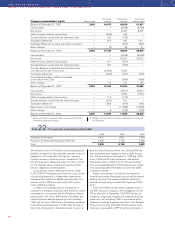Volvo 2000 Annual Report Download - page 58
Download and view the complete annual report
Please find page 58 of the 2000 Volvo annual report below. You can navigate through the pages in the report by either clicking on the pages listed below, or by using the keyword search tool below to find specific information within the annual report.
THE VOLVO GROUP
NOTES TO CONSOLIDATED FINANCIAL STATEMENTS
56
Parent Company holdings of share in subsidiaries as of
December 31, 2000 are shown on pages 90–91.
Significant acquisitions, formations and divestments
within the Group are shown below.
Eddo Restauranger AB
In December 2000, AB Volvo and Volvo Car Corporation
divested in total 51% of the Eddo Restauranger restau-
rant chain to Amica AB, a company within the Fazer
Group. Eddo was 55% owned by AB Volvo and 45% by
Volvo Car Corporation. Amica AB acquired the shares in
proportion to earlier holdings by AB Volvo and Volvo Car
Corporation. The remaining holdings in Eddo by AB
Volvo is 30%. Amica has an option to acquire and AB
Volvo has an option to sell the remaining shares. The
options expire in 2002.
Duffields of East Anglia Ltd
In July 2000, Volvo Trucks acquired Duffields of East
Anglia Ltd, a company that has been a Volvo dealer
since 1969. Duffields is represented in the east of
England where they operate from ten own dealerships,
manage two customer workshops and are responsible
for a small independent dealer.
Volvo (Southern Africa) (Pty) Ltd
In February 2000, the new wholly-owned company Volvo
(Southern Africa) (Pty) Ltd acquired the assets of the
former distributor in South Africa for approximately USD
10 million, including dealerships in South Africa and an
assembly plant for trucks and bus chassis in Botswana.
The company will run operations within the truck, bus,
construction equipment and marine and industrial
engines sectors.
Truck Engine Parts Division
In February 2000, Volvo Aero’s Truck Engine Parts Division
(TEPD) was taken over by the Finnveden engineering
group. TEPD produces components for trucks.
Volvo Maquinaria de Construccion Espana SA
As part of the strategy to mainly organize sales through
independent dealers, Volvo Construction Equipment divest-
ed its market company in Spain in the second quarter of
1999. The buyer was Auto Sueco Lda, which previously
was Volvo’s partner in Portugal for more than 50 years.
The gain on the sale amounted to SEK 0.2 billion.
Pro-Pav and Superpac
In April 1999, Volvo Construction Equipment reached an
agreement covering the sale of its operations under the
trademarks Pro-Pav and Superpac. The operations were
previously conducted within the Canadian subsidiary
Champion Road Machinery.
Mecalac
In March 1999, Volvo Construction Equipment divested
65% of its operations involving compact machinery under
the Mecalac brand name. Concurrently, the intention to
divest the remaining 35% interest within three years was
announced.
Jet Support Corporation
As a result of the agreement between Volvo Aero and
Boeing that grants Volvo Aero exclusive rights to market
and to sell surplus spare parts to the fleet of Boeing air-
craft on the world market, primarily to aircraft types that
are no longer manufactured, the operations of American
Jet Support Corporation were acquired in April 1999.
Note 2Acquisitions and divestments of shares in subsidiaries
Research and development expenses
and warranty expenses
Research and development expenses are charged to
income as incurred.
Estimated costs for product warranties are charged to
cost of sales when the products are sold.
Items affecting comparability
Items affecting comparability are reported separately in
the income statement. They pertain to considerable
restructuring costs and considerable gains and losses
mainly attributable to changes in the composition of the
Group.
Deferred taxes, allocations and untaxed reserves
Tax legislation in Sweden and other countries sometimes
contains rules other than those identified with generally
accepted accounting principles, and which pertain to the
timing of taxation and measurement of certain commercial
transactions. Deferred taxes are provided for on differ-
ences which arise between the taxable value and reported
value of assets and liabilities (temporary differences) as
well as on tax loss carryforwards. However, with regards to
the valuation of deferred tax assets (the value of future tax
deductions), these items are recognized provided that it is
probable that the amounts can be utilized in connection
with future taxable income.
Tax laws in Sweden and certain other countries allow
companies to defer payment of taxes through allocations
to untaxed reserves. These items are treated as temporary
differences in the consolidated balance sheet, that is, a
division is made between deferred tax liability and equity
capital (restricted reserves). In the consolidated income
statement an allocation to, or withdrawal from, untaxed
reserves is divided between deferred taxes and net in-
come for the year.
Application of estimated values
In preparing the year-end financial statements in accord-
ance with generally accepted accounting principles,
company management makes certain estimates and
assumptions which affect the value of assets and liabil-
ities as well as contingent liabilities at the balance sheet
date. Reported amounts for income and expenses in the
reporting period are also affected. The actual results may
differ from these estimates.




